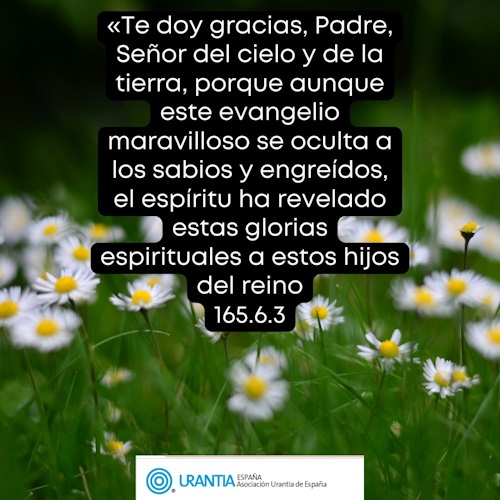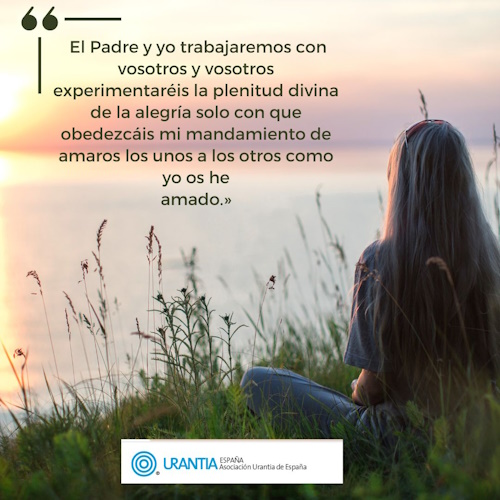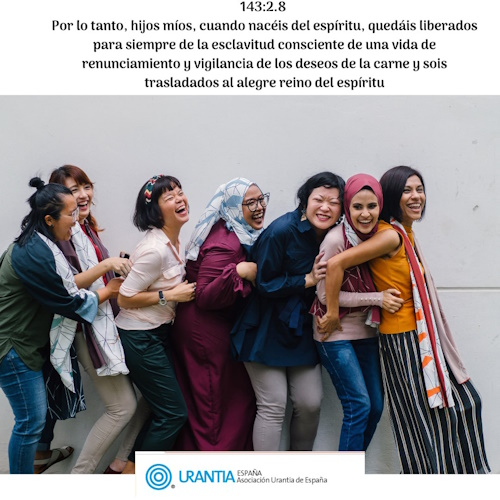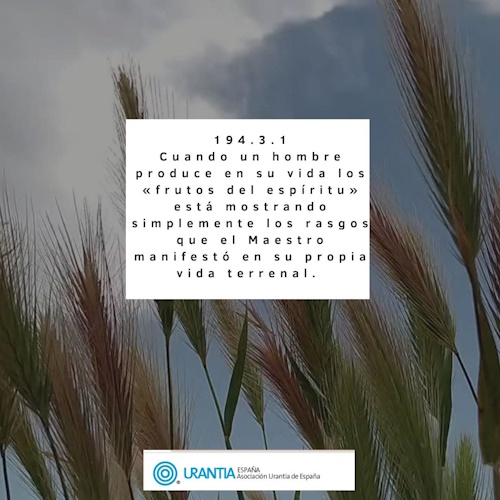© 2023 María José Sánchez Santamaría
© 2023 Urantia Association of Spain

¶ Become yourself
Welcome, welcome, one more month to this meeting point that is the Light and Life newsletter. Make yourself at home, enter and rest from the incessant tasks and get in touch with your innermost being through a whole range of very interesting content. We are not alone in the process of spiritual growth, join us and we will enjoy together this fascinating journey that is life on this planet.
Oh, family, what a world we have had to live in! So full of immense transformations and profound challenges; a world that demands extreme focus on our values and priorities.
Sometimes it’s hard for us to keep up, right? Should we evade our responsibilities, our material experience through our spirituality?
Quite the opposite! We are not here to escape into the spiritual world, we are here, in the physical world, to bring the spiritual world and make this world a garden of Eden.
The incarnation of our beloved Creator, Miguel de Nebadon, is already a palpable sample of that divine desire to exalt material life, to face what it means to live in matter, not to run away from it. The prayer that he prepared in Nazareth for his brothers shows us this:

Our Father who is in heaven,
Hallowed be your name.
Your kingdom come; your will be done
On earth as it is in heaven. (UB 144:3.3-6)
This desire to perfect the material world was by no means to end with his physical departure from our planet. His disciples had the task of continuing to expand that elevation of consciousness that was his message, something that “will make the old world new.”

““You have not merely chosen me, but I have also chosen you, and I have ordained you to go forth into the world to yield the fruit of loving service to your fellows even as I have lived among you and revealed the Father to you. The Father and I will both work with you, and you shall experience the divine fullness of joy if you will only obey my command to love one another, even as I have loved you.”” (UB 180:1.4)
Do you remember the passage about the return of the seventy ordained preachers in Magadan? The return of the disciples is marked by joy after having experienced their own power over the forces of evil: “even the demons submit to us in your name.” They were jubilant, elated, eager to talk about their achievements.
On Friday, December 30, while Jesus was away in the near-by hills with Peter, James, and John, the seventy messengers were arriving by couples, accompanied by numerous believers, at the Pella headquarters. All seventy were assembled at the teaching site about five o’clock when Jesus returned to the camp. The evening meal was delayed for more than an hour while these enthusiasts for the gospel of the kingdom related their experiences. David’s messengers had brought much of this news to the apostles during previous weeks, but it was truly inspiring to hear these newly ordained teachers of the gospel personally tell how their message had been received by hungry Jews and gentiles. At last Jesus was able to see men going out to spread the good news without his personal presence. The Master now knew that he could leave this world without seriously hindering the progress of the kingdom. (UB 163:6.1)
Jesus himself felt euphoric at these events, full of hope for his followers.
And it was at this time, just before partaking of the evening meal, that Jesus experienced one of those rare moments of emotional ecstasy which his followers had occasionally witnessed. He said: “I thank you, my Father, Lord of heaven and earth, that, while this wonderful gospel was hidden from the wise and self-righteous, the spirit has revealed these spiritual glories to these children of the kingdom (UB 163:6.3)
But we already know the depth of thought of our dear Creator, his spiritual insight, so the next day he gathered the seventy and gave them a very important key for them (and for us too):
And now, while I would not quench your spirit of rejoicing, I would sternly warn you against the subtleties of pride, spiritual pride. If you could understand the downfall of Lucifer, the iniquitous one, you would solemnly shun all forms of spiritual pride. (UB 163:6.6)
How right Jesus was in warning them about it! He knew how to point out with certainty the origin of the fall of a high spiritual being, full of enthusiasm, boastful of himself and oversized in his ego.
Spiritual progress is predicated on intellectual recognition of spiritual poverty coupled with the self-consciousness of perfection-hunger, the desire to know God and be like him, the wholehearted purpose to do the will of the Father in heaven. (UB 100:2.1)
Multiple teachings can be extracted from these passages, but today, in this reflection, we are going to focus on one.
Are we full of enthusiasm for the task we have “undertook to teach mortal man that he is a child of God? Do we follow Jesus in his way of relating to others, as this passage reminds us?:
Jesus spread good cheer everywhere he went. He was full of grace and truth. His associates never ceased to wonder at the gracious words that proceeded out of his mouth. You can cultivate gracefulness, but graciousness is the aroma of friendliness which emanates from a love-saturated soul. (UB 171:7.1) [bold added]
Jesus naturally and uncalculated dispensed health and happiness as he journeyed through life. He did good and was cheerful while attending to his daily duties. His vital impulse did not come from an exaltation of personal pride.
How far from this God who is cheerful and in a good mood many of his followers have been throughout history! As a button shows: do you remember Umberto Eco’s book, The name of the rose? This book shows us an image of the medieval Church where fear prevailed, the fear of divinity… and a monastery where people murdered so as not to show the world the value of laughter and joy. Undoubtedly, the climax of the film of the same name is when the veteran monk makes a plea about the “dangers of laughter.” Laughter kills fear, he affirms without hesitation. That’s right: when we laugh we are not thinking about the past, nor the future, nor even the present. We chase away our fears and shadows.
And we? Are we in a good mood, happy, in the certainty of being children of a God? But we are talking about a deep joy, not superficial or exalted like the one the seventy enjoyed after their first preaching outing. It went very well for them and they were rightly happy, their self-esteem rose many points. Later, with the persecutions, the insults and the executions of the followers of the Nazarene, did they all continue in good spirits? Was there integrity in the face of the hard attacks of his pursuers? Do we know how to be whole today in the face of life’s challenges? Do these challenges sweep us away like leaves in the wind?
As you can see everywhere, what is massively promoted to be happy is to earn money and live outside. That is, that your life is pure distraction and that attention is paid to the news, the new video games or the luxurious lives of celebrities. But does that give you the joy and peace you seek?
This society promotes distraction and evasion as a method to be happy, when in reality this distances you from yourself and only postpones dissatisfaction, since it increases desire and increases the fear of not having or not being enough. For example, you will feel better if you are in contact with nature, not if you spend most of your time watching social networks or watching all the series on pay television.
¶ Let’s learn from our Master

Certainly joy, a sense of humor, “change the character of our thoughts”, as the Chinese thinker and writer Li Yutang said. Raise the quality of our thoughts, it is a natural antidepressant. It gives us a breath of hope, it eliminates barriers between humans, it helps us to carry the burdens of daily life more lightly… but we are talking about a joy in our deep being, the joy that is achieved as a fruit of the spirit by affinity with divinity, by being united to Him.

In this regard, it is very useful to remember a passage from the life of Saint Francis of Assisi, one of the little flowers of Saint Francis.
Saint Francis? Little flowers? What is that cheesy?, you may be wondering. Well, these are nothing more than a compendium of episodes from the life of this saint, and they are called little flowers according to the medieval custom that called floretum the selection of the best passages of a work.
Having made the introduction of rigor, today I want to share with you specifically Chapter VIII, “How Saint Francis taught Brother Leo what perfect joy consists of”. Not just any joy, but the perfect joy. It sounds to me that it had to do with some important secret, but while I remember I will leave you with this wonderful text. Find the “pearl” that is hidden there yourself:
Once upon a time Saint Francis went with his brother Leo of Perugia to Santa Maria de los Angeles in winter time. Feeling tormented by the intensity of the cold, he called Brother Leon, who was walking a little ahead, and spoke to him thus:
“Oh, brother Leon! Even if the Friars Minor gave a great example of holiness and good edification throughout the world, write and take note diligently that perfect joy is not in that.”
Continuing further, he called Saint Francis a second time:
“Oh, brother Leon! Though the younger brother restore sight to the blind, straighten the crippled, drive out demons, make the deaf hear, the lame walk, speak to the worlds, and what is more, raise a four-year-old dead. days, write that the perfect joy is not in that.”
Walking a little further, Saint Francis shouted loudly:
Oh, brother Leon! Even if the younger brother came to know all the languages “and all the sciences and all the Scriptures to the point of being able to prophesy and reveal not only future things, but even the secrets of consciences and souls, he writes that this is not the perfect joy.”
A little later, Saint Francis called him again raising his voice:
“Oh, brother Leon, sheep of God!” Although the younger brother spoke the language of the angels and knew the course of the stars and the virtues of the herbs, and all the treasures of the earth were discovered to him and he knew all the properties of the birds, of the fish, of all the animals, men, trees, stones, roots and waters, write that perfect joy is not in that.
It went on like this for two miles. Finally brother Leon, full of astonishment, asked him:
—Father, I ask you on behalf of God to tell me what is perfect joy.
And Saint Francis replied:
—Yes, when we arrive at Santa María de los Ángeles, wet as we are from the rain and stunned by the cold, covered in mud and fainting with hunger, we knock on the door of the place and the porter arrives grumpily and shouts: “Who are you?”, and we tell him: “we are two of your brothers”. And he says: “lie! You are two rascals who are deceiving the world and stealing alms from the poor. Out of here!”. And it doesn’t open us up and it keeps us out there enduring the snow and the rain, the cold and the hunger until the night. If we can bear with patience, without getting upset and without murmuring against him, all these insults, this cruelty and this rejection, and if we rather think, with humility and charity, that the gatekeeper knows us well and that it is God who makes him speak thus against us, write, oh brother Leon!, that here there is perfect joy.
And if we keep calling, and he comes out furious and throws us out, insulting and beating us, like importunate undesirables, saying: «Get out of here, you miserable petty thieves! Go to the hospital, because here there is no food or lodging for you!" If we bear it with patience and joy and in good charity, oh, brother Leon!, write that there is perfect joy here.
And if we, forced by hunger and the cold of the night, still call again, shouting and begging between tears for the love of God, that he open us and allow us to enter, and he, even more enraged, says: “go with these heavy undesirables! I’m going to give them what they deserve.” And he comes out with a knotty stick and grabs us by the hood and throws us to the ground and drags us through the snow and beats us with all the knots on that stick; If we endure all this with patience and joy, remembering the sufferings of the blessed Christ, which we have to endure for his love, oh, brother León! write that there is perfect joy here.
»And now listen to the conclusion, brother Leon: above all the graces and all the gifts of the Holy Spirit that Christ grants to his friends, there is that of overcoming oneself and of bearing with pleasure, for the love of Christ Jesus, sorrows, injuries, opprobriums and discomforts. For in all the other gifts of God we cannot boast, since they are not ours, but God’s; that is why the apostle says: what do you have that you did not receive from God? And if you have received it from Him, why do you glory as if you had it from yourself? (1 Cor 4,7). But on the cross of tribulation and affliction we can glory, since this is ours."
Tremendous text, right?
Dying to the desire to be warm, when it’s cold and always be grateful. Free ourselves from lawful worldly desires. Deep joy without being connected to success or failure. Going above or below that external elements…
The attitude, then, is the fundamental thing. The attitude of joy and gratitude, following the example of our beloved Master. Someone who has done cleaning at home with love, someone who has worked at their job with a loving conscience, someone who has played sports with awareness of the present, there, finally, they will find the perfect joy. The joy of the children of God. Even in the cold weather… because everything is united to God.
And with that perfect joy, we can truly bring Heaven to Earth.